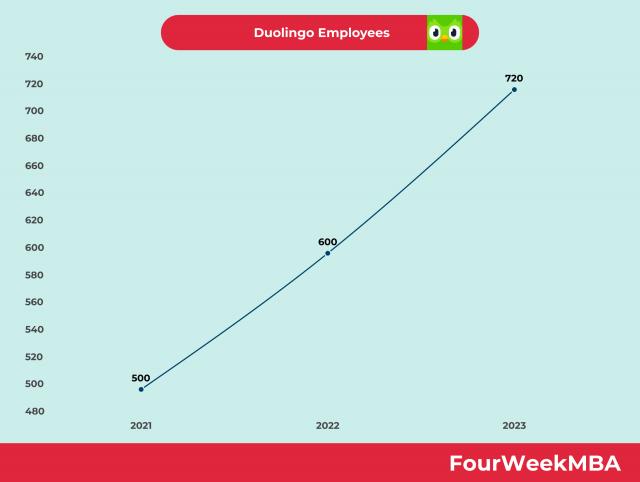Duolingo had 720 employees in 2023, compared to 600 employees in 2022, and 500 employees in 2021.
Related Visual Stories
Who Owns Duolingo
Duolingo is mostly owned and controlled by its co-founders and top executives Luis von Ahn, and Severin Hacker, who have a majority stake in the company which also gives them wide control of it. Other top institutional investors comprise CapitalG, Durable, Baillie Gifford & Co, Vanguard, and Blackrock. Duolingo Revenue
Duolingo generated $531.11 million in revenue in 2023, compared to $369.49 million in 2022, and $250.77 million in 2021.
Is Duolingo Profitable?
Duolingo was profitable in 2023, as it reported a net income of $16.07 million in 2023, compared to a net loss of $59.57 million in 2022 and $60.13 million net loss in 2021.
Duolingo Monthly Active Users
Duolingo had 88.4 million monthly active users in 2023, compared to 60.7 million in 2022, and 40.5 million in 2021.
Duolingo Paid Subscribers
Duolingo had 6.6 million paid subscribers in 2023, compared to 4.2 million in 2022 and 2.5 million in 2021.
Duolingo Revenue Per Employee
Duolingo generated $737,651 per employee in 2023, compared to $615,825 in 2022, and $501,544 in 2021.
Related EdTech Business Models
Coursera Business Model
Coursera is an American massive open online course (MOOC) provider founded by Andrew Ng and Daphne Koller in 2012. Coursera revenue is categorized according to consumer, enterprise, and degrees. The consumer category accounts for the majority of revenue with multiple studies and course options for individual students looking to upskill.
Duolingo Business Model
Duolingo is an EdTech platform leveraging gamification to enable millions of users to learn languages. Duolingo leverages a hybrid between ad-supported and freemium models. Indeed, the free app makes money through advertising. Free users are also channeled into premium subscriptions with an ad-free experience and more features.
Khan Academy Business Model
Khan Academy is an EdTech non-profit organization whose mission is “to provide a free, world-class education to anyone, anywhere,” It runs thanks to the sponsors of various donors that keep the platform developing content at scale for its millions of students across the world.
Masterclass Business Model
Started as an attempt to transform education, MasterClass finds top talents and turn them into instructors. With a straightforward membership model of $180 per year, the streaming online education platform gives access to all its courses and the new releases on the platform. In 2020, it got valued at over $800 million.
Udacity Business Model
Udacity is a freemium EdTech platform, offering MOOCs (courses open to anyone for enrolment). Udacity partners up with companies and universities to offer nanodegrees (short-term online education programs focused on specialized skills in computer science). The user either pays a one-time or subscription fee to access one or all courses.
Udemy Business Model
Udemy is an e-learning platform with two primary parts: the consumer-facing platform (B2C). And the enterprise platform (B2B). Udemy sells courses to anyone on its core marketplace, while it sells Udemy for Business only to B2B/Enterprise accounts. As such, Udemy has two key players: instructors on the marketplace, and business instructors for the B2B platform.
Skillshare Business Model
Skillshare is an online learning community platform offering educational videos through subscriptions. The idea for the platform came from Michael Karnjanaprakorn, who lamented that his college degrees had no real-world application. Skillshare employs a marketplace model of revenue generation. The bulk of its revenue comes from monthly, annual, and enterprise subscriptions. Skillshare also earns referral fees from the related products it shows to consumers on annual subscriptions. Some of these products are high-margin and subscription-based, representing a lucrative income source.
Kahoot Business Model
ian game-based learning platform founded in 2012 by Johan Brand, Jamie Brooker, and Morten Versvik. It is based on a university-developed interactive learning game called Lecture Quiz.
Kahoot is free to use for players. Instead, the company makes money by selling access to various adaptations of the game fit for educational or enterprise contexts. Prices depend on the number of game participants and the level of functionality.
Kahoot also makes money by licensing its gaming platform to third-party publishers that want a grow an engaged audience.
Read Next:
- How Does Robinhood Make Money
- How Does Venmo Make Money
- How Does Honey Make Money
- How Does YouTube Make Money
- How Does Telegram Make Money
- How Does Discord Make Money
Main Free Guides:
- Business Models
- Business Strategy
- Business Development
- Digital Business Models
- Distribution Channels
- Marketing Strategy
- Platform Business Models
- Tech Business Models
The post Duolingo Employees appeared first on FourWeekMBA.

